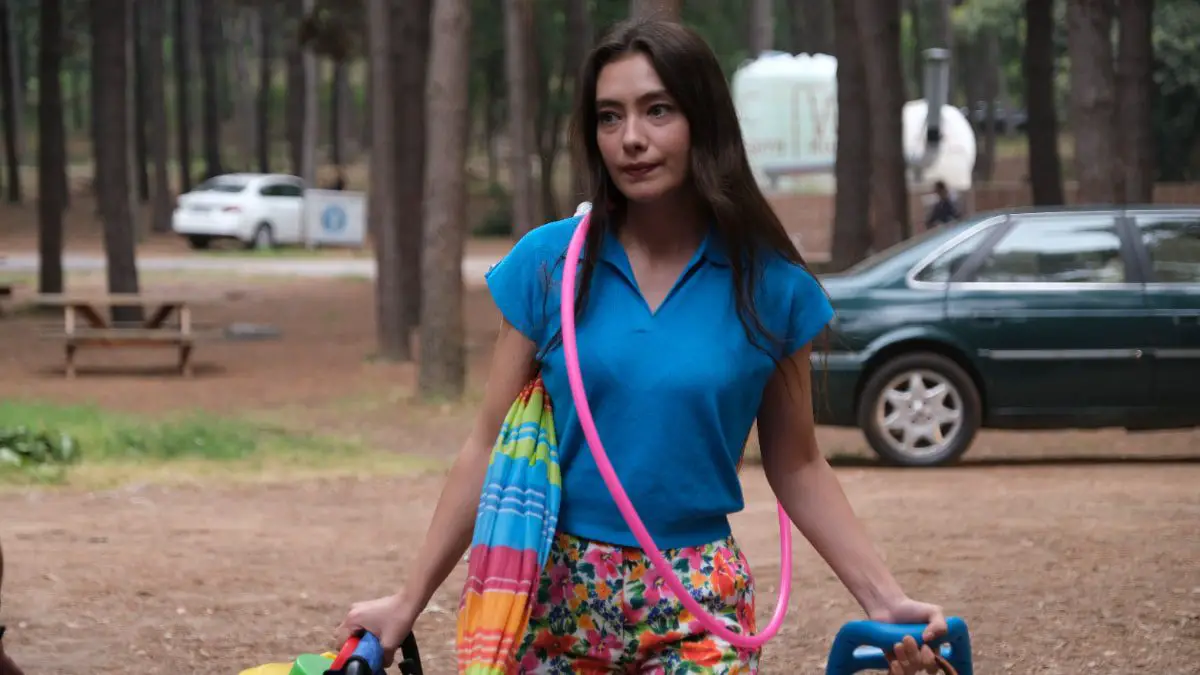There’s a line from a Canadian murder mystery show, “Endgame,” that kept popping up in my head watching Oh Belinda. The Russian character, Arkady Balagan, tells a woman, “In the original Russian, Chekov plays are comedies.”
In other words, something got lost in translation. Deniz Yorulmazer’s remake of Atif Yilmaz’s Aahh Belinda, sadly unseen by me, feels less like a comedy than a waking nightmare. Oh Belinda is the tale of a well-to-do actress Dilara (Neslihan Atagul), who does a shampoo commercial. Her character is a middle-class housewife named Handan. During the filming, she finds herself trapped in Handan’s life. It feels more like something from Tales From the Darkside. The shampoo is called, of course, Belinda. If this is a Turkish comedy, John Cassavetes’s A Woman Under the Influence could be considered a Turkish farce.

It doesn’t help that Yorulmazer’s remake lacks any energy. There’s no rhythm to the editing. Events begin to pile up. as Atagul discovers that her character Handan, is not only having an affair with her brother-in-law but is also embezzling money from the bank she works at. This subplot, I have discovered from some research, was not part of the 19886 original.
One of the many thoughts that occurred to me during Oh Belinda, besides “Poor Dilara,” or “Poor Handan,” was this feels diluted by a corporate streaming giant. Indeed, much of Oh Belinda feels like the film is reaching, but for what? It never becomes all that clear. It is a remake that, even having never seen the original, makes me feel that it is a pale imitation of its predecessor.
Oh Belinda never figures out its own identity, much less Dilara and Handan’s. Yorulmazer spends so much time trying to force the feeling of madcap energy through quick cuts that he forgets to have anything happen. The stuff with Handan’s brother-in-law and the stolen money is manufactured melodrama and has nothing to do with Handan or Dilara’s growth. All it does is show us that Handan herself is not all that great, but if Handan is a philandering thief, what lesson should Dilara learn?
After all, Yorulmazer and Hakan Bonomo go to great lengths to show us that Dilara, the actress is a posh, stuck-up, career-oriented woman who sneers at middle-class women who have chosen families over careers. Once Dilara is thrust into Handan’s life, is meant to be a wake-up call to how she should respect women who have made different life choices? Or is it simply a one-note joke about how Dilara was told to be Handan by her director, and now she is?
Perhaps this is Yorulmazer and Bonomo’s way of making fun of how in-depth actors can do their job. A sly way of satirizing how taking the job too seriously; this is a shampoo commercial, for crying out loud. Except, that notion is never brought up, and Yorulmazer and Bonomo are far too busy putting poor Handan into situations that make us in the audience squirm.
Whether it’s watching the poor woman all of a sudden find herself married to her co-star in the commercial-also as the character Nectai (Necip Memili), who is either trying to have sex with her or yell at her for not having sex with him, her kids who seem to think something is off, or the way Nectai screams at the kids for interrupting his attempts to have sex with his wife. Worse is that in the real world of filming the commercial, we meet Nectai, a struggling actor who invades Dilara’s space and leers at her as they film her taking a shower. The fact that she all of a sudden finds herself married to him isn’t funny so much as ghoulish, as is the way she tries to fight off his attempts at sex until she finally gives in, in a scene that is meant to be funny or revelatory but in reality is just a way to wrap up the stolen money storyline that nobody, not even the filmmakers, seems all that interested in.
Poor Handan is eventually committed to an asylum because she insists she’s not Handan, wife and mother, but Dilara, a famous actress. Now, here’s where Oh Belinda finds its real potential. The way Yorulmazer and Bonomo show how society constricts women’s roles and how those constrictions can drive a woman to the breaking point is a film unto itself. But the fact that they spend so little time on this makes it less exciting and more maddening as they are so close to a point.
Even Handan’s character growth is less her accepting her fate and more playing along until she can become an actor, thereby reclaiming her old life. The problem is this makes scenes where she befriends her sister-in-law Feride (Gamze Karaduman) feel less genuine and less about sisterhood and more about how Dilara as Handan is using people. Then again, from the looks of it, the only difference between Dilara and Handan is that Handan settled and Dilara didn’t, which is the point, but it is a point the movie never effectively makes or explains why.

None of this is helped by how Memili’s Nectai appears to exist to either be horny or angry. We know Handan works at the bank, but what is Nectai’s job? Nectai supposedly loves Handan. But we never see anything beyond lust, anger, or confusion as to why she’s not happy. Again, you could argue that she wouldn’t consider this since this is taking place in her head.
But, we rarely discover anything about Dilara or Handan, except both are unhappy. Again, the threat of a point is always nearby, but neither Yorulmazer nor Bonomo ever has the guts to make it.
Yet, more to the point, is it happening in her head? Oh Belinda does the classic cowardly, “Maybe it wasn’t” style ending, despite overtly stating it was. When her director friend Timo (Tim Seyfi) compliments her performance by saying it’s excellent, they’ll do a series of commercials. I felt a chill go up my spine as he said this.
For as much time as we spend with Atagul’s characters, we’re never quite sure what drives either one. A shame because the one constant in this whole mess is Atagul; she’s fantastic. For as much as I was lost and confused, Atagul always seemed to have the emotional center of her character nailed down; there was not a false moment in her whole performance. In a movie like Oh Belinda, filled with false moments, that’s saying something.
Tolga Cetin, who shot Oh Belinda, gives the film a lovely polished look. Unfortunately, Yorulmazer doesn’t utilize Cetin’s apparent talents. Oh Belinda looks good, with Cetin’s staging at times bordering on masterful. One scene in the beginning, where he shows the commercial filming, with the crew gathered around filming Dilara in the shower, has a wonderful frame composition. But these moments are rare. Another memorable scene has Atagul’s Handan gyrating in the rain as she tosses the stolen money off the top of a theater comes to mind as something that felt ripped from an 80s hair metal rock video and is one of the few scenes in which the visual is connected to the character’s emotional arc.
Cetin’s camera does a splendid job in objectifying Atagul, not for the audience’s benefit, but because men constantly view Dilara and Handan merely as a tool for sex. Of the many fumbled themes is how Yorulmazer and Bonomo show how the men in Handan’s life treat her as a sexual object compared to how the men in Dilara’s life treat her like a person who is sexual. The class differences leading to men’s views of women and sex changes would have been fascinating. Still, I suspect there might also be some plain old-fashioned studio prudishness besides my cultural ignorance of Turkish culture.
Unfortunately, both Yorulmazer and Bonomo seem incapable of fleshing out their ideas or have any desire to delve into narrative or character exploration. As a result, Oh Belinda is my least favorite type of movie. It is a middling well-made film that wastes ideas and a talented cast and crew.
Images courtesy of Netflix
Have strong thoughts about this piece you need to share? Or maybe there’s something else on your mind you’re wanting to talk about with fellow Fandomentals? Head on over to our Community server to join in the conversation!

